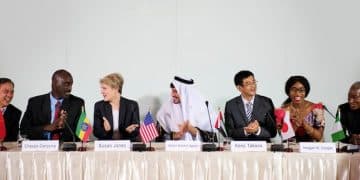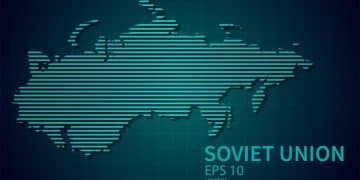US & WHO: Reassessing Relationship After Recent Changes
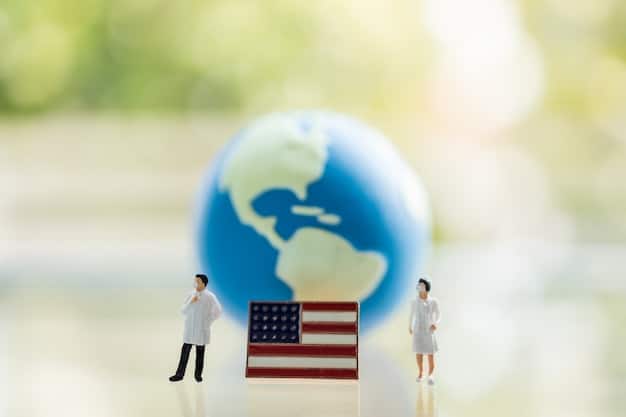
Advertisements
The United States’ intricate relationship with the World Health Organization has seen significant shifts, necessitating a reassessment of its dynamics and implications for global health governance following recent geopolitical and public health developments.
The relationship between the United States and the World Health Organization has long been a cornerstone of global health initiatives, yet recent events have undeniably reshaped its contours. Understanding these shifts is crucial not only for policymakers but also for anyone concerned with the future of international cooperation in public health. This article delves into the complex history, present challenges, and future prospects of The US and the World Health Organization: Reassessing the Relationship After Recent Changes, offering a comprehensive look at what these evolving dynamics mean for global health diplomacy.
Historical Foundations of US-WHO Engagement
The United States has historically been a pivotal player in the establishment and ongoing operation of the World Health Organization (WHO), largely driven by a post-World War II vision of collective security and global well-being. This engagement was not merely philanthropic; it was deeply rooted in the understanding that health threats transcend borders, making international cooperation a strategic imperative for national security and economic stability. From its inception in 1948, the WHO benefited significantly from U.S. financial contributions, technical expertise, and diplomatic leadership, which helped shape its early focus on eradicating infectious diseases and strengthening public health infrastructures worldwide.
Early Collaborations and Shared Objectives
In the mid-20th century, the shared objectives between the U.S. and the WHO revolved around combating major health scourges like smallpox, malaria, and polio. The U.S. provided substantial funding and scientific prowess, enabling large-scale vaccination campaigns and research efforts that yielded remarkable successes. These early collaborations fostered a sense of mutual dependence and shared destiny, where American foreign policy often aligned with WHO’s global health agenda. This period was characterized by a relatively harmonious relationship, driven by common humanitarian goals and scientific consensus.
- Universal health coverage advocacy
- Disease surveillance system development
- Maternal and child health improvements
- Access to essential medicines initiatives
However, even in these earlier decades, there were occasional disagreements, particularly concerning resource allocation priorities and the political influences within the WHO. The U.S., as the largest donor, often sought to steer the organization’s agenda to reflect its national health priorities and foreign policy objectives. This dynamic, while generally constructive, laid the groundwork for future tensions as the global health landscape became more complicated and multi-polar. The fundamental premise remained that a strong WHO was in the U.S. national interest, serving as a critical platform for addressing health challenges that could not be contained within national borders.
Recent Dynamics and Points of Contention
The relationship between the U.S. and the WHO has witnessed considerable strain and recalibration in recent years, particularly against the backdrop of significant global health crises. While the U.S. has historically been the WHO’s largest donor, various administrations have voiced concerns regarding the organization’s responsiveness, independence, and perceived biases. These points of contention are multifaceted, encompassing issues from pandemic response effectiveness to geopolitical influences within the WHO’s governance.
Pandemic Preparedness and Response Criticisms
A major turning point came with the COVID-19 pandemic. The U.S. government, particularly the Trump administration, heavily criticized the WHO’s initial handling of the outbreak, alleging a lack of transparency from certain member states and an insufficient early warning system. These criticisms culminated in a decision to withdraw from the WHO in 2020, a move that stunned the global health community and highlighted the depth of the distrust that had developed. While the Biden administration reversed this decision, the episode revealed underlying fragilities in the long-standing alliance.
- Allegations of delayed information sharing
- Concerns over investigative independence
- Critiques on travel and trade recommendations
- Calls for comprehensive WHO reforms
Funding, Transparency, and Accountability Concerns
Beyond pandemic response, the U.S. has consistently raised questions about the WHO’s funding mechanisms, transparency in its operations, and overall accountability. A significant portion of WHO’s budget comes from voluntary contributions, which often come with strict earmarks, potentially influencing the organization’s priorities. The U.S. has advocated for greater transparency in budgetary allocations and a more robust accountability framework to ensure that funds are used effectively and align with global health needs. These concerns are not new, but they have gained renewed urgency given the scale of recent global health emergencies. The push for reforms is a recurring theme from successive U.S. administrations, aiming to ensure the WHO remains an agile and effective guardian of global health.
The Impact of Geopolitical Shifts on the Relationship
The relationship between the U.S. and the WHO cannot be fully understood without acknowledging the profound impact of evolving geopolitical landscapes. The rise of new global powers, particularly China, and the shifting dynamics of international relations have introduced complexities that directly influence how the U.S. approaches its engagement with multilateral organizations like the WHO. This geopolitical lens reveals that health diplomacy is often intertwined with broader strategic competition and ideological differences.
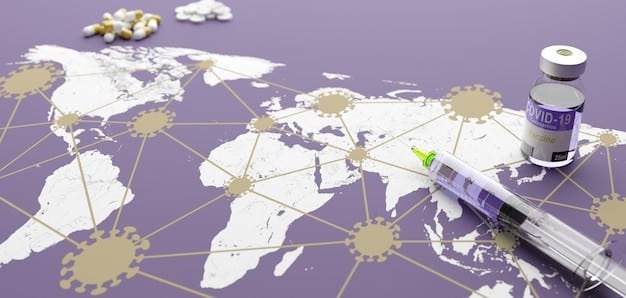
China’s Growing Influence and US Concerns
China’s increasing economic and political clout has translated into greater influence within various international bodies, including the WHO. The U.S. has expressed concerns that this growing influence could potentially undermine the WHO’s neutrality and objectivity, particularly on sensitive issues that involve Chinese national interests. The alleged delay in sharing information during the early stages of the COVID-19 pandemic, for example, was framed by some U.S. officials as evidence of China’s undue influence over the WHO’s initial response and investigations.
Multilateralism in a Fragmented World
The broader trend towards a more fragmented and less predictably multilateral world also shapes the U.S.-WHO relationship. As some nations increasingly favor bilateral agreements over multilateral frameworks, the traditional role and effectiveness of organizations like the WHO are sometimes challenged. The U.S., while historically a proponent of multilateralism, has at times exhibited a more transactional approach to international relations, leading to periods of disengagement from global institutions. This tension between multilateral engagement and national sovereignty, exacerbated by a competitive geopolitical environment, directly impacts the continuity and stability of U.S. interactions with the WHO. The challenge for both parties is to navigate these complex geopolitical waters while ensuring that the core mission of global health protection remains paramount.
Reassessing US Priorities and Engagement Strategies
Following the turbulent period marked by the U.S. withdrawal and subsequent return to the World Health Organization, there is a clear imperative for Washington to reassess its priorities and formulate a more consistent and effective engagement strategy. This reassessment goes beyond simply rejoining; it involves defining what kind of WHO the U.S. envisions and how it intends to contribute to — and influence — its future direction. The goal is to maximize the benefits of multilateral cooperation while safeguarding U.S. interests and promoting global health security.
Strategic Re-engagement and Reform Agenda
The Biden administration’s decision to rejoin the WHO signaled a return to a more traditional, multilateral approach to global health. However, this re-engagement is not a simple return to the status quo. The U.S. has reiterated its commitment to working within the WHO but has also emphasized the need for significant reforms. These reforms often center on enhancing the WHO’s independence, improving its emergency response capabilities, and ensuring greater financial transparency and accountability. The U.S. seeks a WHO that is more agile, resilient, and less susceptible to political pressures, ensuring that it can effectively lead global efforts against future health threats.
- Strengthening WHO’s emergency response mechanisms.
- Enhancing data sharing protocols for pandemics.
- Promoting greater financial transparency and oversight.
- Advocating for independent evaluations of health crises.
Balancing National Interests with Global Imperatives
A critical aspect of the U.S. reassessment involves striking a delicate balance between its national interests and broader global health imperatives. While the U.S. prioritizes the health and security of its own citizens, it also recognizes that many health challenges, from infectious diseases to climate change impacts, require collective action. Therefore, the engagement strategy aims to leverage the WHO as a platform to advance U.S. health security objectives, such as preventing the spread of diseases to American shores, while simultaneously contributing to the global good. This involves active participation in WHO governance, providing technical expertise, and maintaining significant financial contributions, all aimed at fostering a more robust and effective global health architecture that ultimately serves both U.S. and international interests.
Future Outlook: Challenges and Opportunities for Collaboration
The future trajectory of The US and the World Health Organization: Reassessing the Relationship After Recent Changes is poised at a critical juncture, presenting both formidable challenges and unique opportunities for deepening collaboration. As the world grapples with persistent health disparities, the ongoing threat of pandemics, and the complex impacts of climate change on health, a strong and cohesive relationship between the U.S. and the WHO is arguably more vital than ever. Navigating this path will require sustained diplomatic effort, mutual understanding, and a shared vision for global health security.
Addressing Future Health Crises Together
One of the most pressing opportunities for renewed collaboration lies in addressing future health crises. The lessons learned from previous pandemics highlight the indispensable role of a coordinated global response, spearheaded by a credible international body like the WHO. The U.S. can play a crucial role by investing in global surveillance systems, contributing to rapid vaccine and therapeutic development, and supporting the equitable distribution of health resources worldwide. Strengthening the WHO’s capacity to detect, prevent, and respond to outbreaks is a shared objective, and U.S. leadership in these areas can significantly enhance global health resilience. This collaborative framework ensures that collective scientific and financial resources are effectively marshaled to mitigate the impact of emergent health threats.
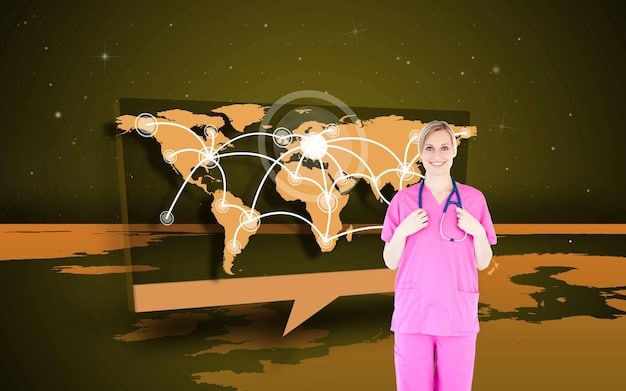
Rebuilding Trust and Ensuring Sustainability
Beyond immediate crisis response, a key challenge is rebuilding trust and ensuring the long-term sustainability of the U.S.-WHO relationship. This involves addressing the root causes of past disagreements, such as concerns over transparency and accountability, through constructive dialogue and concrete reforms. For the U.S., a consistent and predictable engagement policy, irrespective of domestic political shifts, will be crucial. For the WHO, demonstrating its neutrality, efficiency, and effectiveness in its operations will bolster confidence among its leading member states. Ultimately, a strong, adaptable, and trusted WHO is in the interest of all nations, including the U.S., as it provides the essential platform for collective action on health issues that no single country can tackle alone. The willingness to invest in this partnership, both financially and politically, will define its success in the years to come.
Strengthening Global Health Governance: The Path Forward
The imperative to strengthen global health governance, with a resilient U.S.-WHO relationship at its core, represents a significant path forward in an increasingly interconnected and vulnerable world. The complexities of preventing and responding to global health threats demand a framework that is both robust and flexible, capable of adapting to emerging challenges while upholding principles of equity and cooperation. This journey toward enhanced governance is not without its difficulties, but the potential rewards—a healthier, more secure global population—are immense.
Fostering Collaborative Diplomacy and Shared Responsibility
A fundamental component of strengthening global health governance involves fostering a spirit of collaborative diplomacy and shared responsibility among nations. The U.S., as a leading global power, has a unique opportunity to champion this approach within the WHO and beyond. This means actively engaging in negotiations for new international health regulations, promoting robust data sharing mechanisms, and committing to fair and equitable access to innovations in health. By viewing global health not just as a humanitarian concern but as a strategic imperative for collective security, the U.S. can galvanize international partners toward more effective collective action. This shift in mindset emphasizes that global health is a shared burden and a shared benefit, transcending national borders and political ideologies.
Investment in Health Systems and Preparedness
Finally, sustainable global health governance necessitates sustained investment in health systems and preparedness capabilities worldwide. The U.S. can lead by example, both domestically and through its contributions to the WHO and other multilateral initiatives. This involves supporting capacity building in low- and middle-income countries, strengthening their epidemiological surveillance, laboratory networks, and healthcare workforces. Such investments are not merely acts of generosity; they are strategic contributions to global health security, reducing the risk of future pandemics and ensuring that all nations are better equipped to protect their populations. By committing to long-term partnerships and fostering a culture of readiness, The US and the World Health Organization: Reassessing the Relationship After Recent Changes can transcend past difficulties and forge a more resilient, equitable, and effective global health future. The ultimate goal is to build a world where health crises are met with coordinated, rapid, and compassionate responses, minimizing their human and economic toll.
| Key Point | Brief Description |
|---|---|
| 🤝 Historical Ties | U.S. has been a foundational pillar and major contributor to WHO since 1948, shaping global health. |
| 📉 Recent Tensions | COVID-19 pandemic fueled U.S. criticisms leading to temporary withdrawal and calls for reform. |
| 🌍 Geopolitical Influence | Shifting global power dynamics, particularly China’s rise, impact U.S. views on WHO neutrality. |
| 🔭 Future Collaboration | Opportunities exist to strengthen global health governance through renewed U.S. engagement and WHO reforms. |
Frequently Asked Questions About The US and The WHO
▼
The Trump administration announced its withdrawal in July 2020, citing concerns over the WHO’s handling of the COVID-19 outbreak, particularly its perceived alignment with China and alleged failure to provide accurate timely information. The administration also raised issues regarding the WHO’s structure and reform needs, believing the organization was not adequately serving its global health mandate.
▼
As the largest donor, the U.S. contributes significantly to WHO’s budget, granting it considerable influence over the organization’s priorities and operations. This financial leverage positions the U.S. to advocate for reforms, set agendas, and steer global health initiatives that align with both American interests and broader humanitarian goals. Its contributions are vital for WHO’s operational capacity.
▼
Geopolitical rivalry complicates the relationship by framing U.S. engagement through the lens of strategic competition. U.S. concerns about China’s growing influence within the WHO can lead to distrust and a push for greater transparency and accountability, affecting collaborative efforts on global health issues. The dynamic often reflects broader international power struggles.
▼
The U.S. generally advocates for reforms aimed at enhancing WHO’s independence, improving its emergency response mechanisms, increasing financial transparency, and strengthening its capacity for independent investigations into outbreaks. These reforms are intended to make the WHO more agile, resilient, and effective in its primary role of safeguarding global health from future threats.
▼
A robust U.S.-WHO relationship is crucial because global health threats, such as pandemics, transcend national borders, requiring coordinated international responses. The U.S. brings unparalleled scientific, financial, and diplomatic resources, while the WHO provides the essential multilateral platform for global health governance, surveillance, and strategy implementation. Their collaboration is key to collective action.
Conclusion
The evolving relationship between the United States and the World Health Organization is a testament to the dynamic nature of international relations and global health. While marked by a rich history of collaboration and recent significant challenges, the path forward underscores the undeniable necessity of a strong, reformed, and mutually respectful partnership. The lessons gleaned from past global health emergencies highlight that effective multilateralism, championed by nations like the U.S., remains the most potent tool against shared health threats. Reassessing and revitalizing this relationship is not merely a diplomatic exercise but a critical imperative for building a more resilient and healthier world for all.



